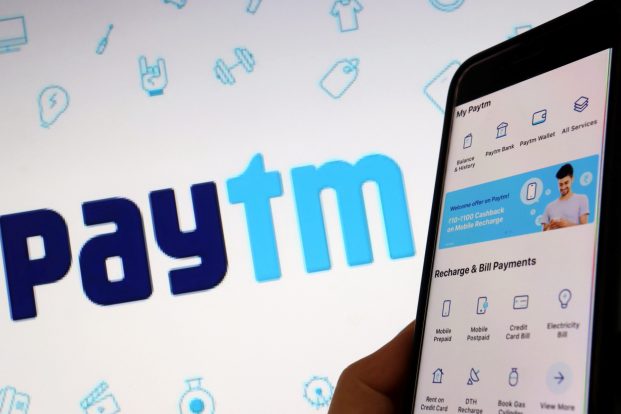(AF) Shares of One 97 Communication Ltd, the firm that operates Paytm, made a lacklustre debut on Indian exchanges on Thursday, crashing 28% in intraday trading.
The stock listed on the National Stock Exchange of India at Rs 1,950 ($26.28), a 9.3% discount to its issue price of Rs 2,150 ($28.98) apiece. The shares extended losses later, hitting the day’s low of Rs 1,560 at the close.
“The biggest reason for the flop was its valuation, while there is no apple-to-apple comparison yet, this IPO was undoubtedly richly valued given that Paytm is still a loss-making company with no certainty about when it would turn in profits,” said Santosh Meena, Head Of Research at Swastika Investmart, a Moumbai-based stock broker firm.
According to a report released by global broker Macquarie on Thursday, Paytm’s valuation, at 26 times FY23 price to sales (P/S), was expensive, especially when profitability remains elusive for a long time.
“Most fintech players globally trade around 0.3-0.5 times PSG (price to sales growth ratio) and we have assumed the upper end of this band. We are unwilling to give it a premium here as we are unsure about the path to profitability. Key risks include change in regulations which allow monetisation of UPI and receipt of a banking licence,” wrote Suresh Ganapathy, associate director at Macquarie in that report
The $2.46 billion public issue of One97 Communications, the largest ever in India, was subscribed 1.89 times in the price band of Rs 2,080 to 2,150 ($28-$29).
Paytm reported a gross merchandise value (GMV) of Rs 4 trillion (around $50 billion) in the 2021 fiscal year. GMV is the total value of merchandise sold.
The payments platform gets a major portion of its revenue from transaction fees that it collects from merchants for payment services. Paytm had reported negative cash flows from operations in each of the past three years due to operating losses and additional working capital requirements.
Crowded Market
Paytm started off as a bill payments and mobile recharge platform in 2010 and gradually evolved into a comprehensive payments ecosystem that now includes payments, insurance, wealth management and e-commerce operations, among others.
Yet, none of these ventures have resulted in significant revenue or profit for Paytm, say analysts. What’s more, outside of payments, the fintech has not acquired considerable market leadership in any of its verticals, they add.
“While the IPO was highly valued, Paytm’s future growth prospects are also clouded by the competition it confronts in the industry. Paytm’s payment business generates over 70% of its revenue, which is driven not just by significant local businesses like SBI and UPI, but also by global behemoths like Google and Amazon,” says Avinash Gorakshakar, Head of Research at Mumbai-based Profitmart Securities.
Much of what Paytm does is also done by Amazon, Flipkart, Google and other key ecosystem players, according Macquarie, while competition is fierce in the BNPL (buy now, pay later) arena to as well as and in the distribution of various financial products.
Competition and restrictions will drive take rates in the distribution company south in the long run, Macquarie added.
“Clearly, PayTM will have to migrate to higher value-added businesses like fee-based businesses, but that migration will take at least three years to start yielding results. Until then, the fear is PayTM will continue to be in red,” feels Gorakshakar.
Alternatives Abound
Nevertheless, the largest ever IPO that has already eroded about billion of investors’ wealth, on debut listing, now faces the question of whether the optimism around this celebrity fintech has gone too far.
Ahead of the offer, Paytm, which has Warren Buffet, Alibaba and Softbank as anchor investors, raised 82.35 billion rupees from 74 other investors including BlackRock and the Canada Pension Plan Investment Board.
“There are alternative options that offer better growth prospects,” says Meena.
Indian companies have raised a record $9.7 billion through IPOs in 2021 so far, figures from market monitor Prime Database showed.
Food delivery giant Zomato was the country’s biggest IPO of the year until now with its $1.3 billion share issue in July.
This year, India has also seen a record number of unicorns created – start-ups with a valuation of $1 billion or more – benefiting from investors spooked by a crackdown on technology giants in China.
- Jim Pollard
























